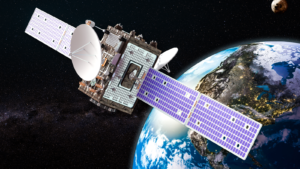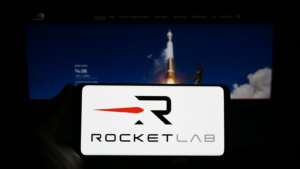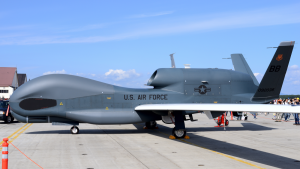There are many opportunities for investors to capitalize on the growing space industry, which includes satellite communication, space tourism, and even asteroid mining. As governments and private companies increase their investments in space exploration and technology, the potential for innovation and profitability in this sector becomes even more apparent.
So, for this article, I’ve put together a list of seven of the most promising space stocks that are all vying for your investment dollars. The companies are some of the best that the market has to offer. I think investors of all degrees of risk tolerances can consider them.
Virgin Galactic (SPCE)

Virgin Galactic (NYSE:SPCE) is pioneering commercial human spaceflight, offering space tourists the chance of a lifetime to venture into space.
Although SPCE has seen its stock price fall deeply into penny stock territory, down 83.68% over the past five years, the company has outlined plans for growth and survival through at least 2026, suggesting a focus on overcoming past hurdles and capitalizing on future opportunities.
For 2024, Virgin Galactic’s guidance and outlook involve continuing its space tourism and research missions. The company’s plans include a notable shift towards developing its next-generation spacecraft.
In terms of valuation and analyst ratings, SPCE has been deemed undervalued by some analysts following its recent price drops. This suggests that the market may not fully account for the company’s potential growth or recovery. This then makes it one of those space stocks to consider.
EchoStar Corporation (SATS)

EchoStar Corporation (NASDAQ:SATS) delivers satellite communication solutions, specializing in broadband internet services across the Americas. The company has taken significant steps so far in 2024. Notably, its merger with DISH Network Corporation, aiming to enhance its strategic value. The merger is expected to provide EchoStar with substantial net cash generated from DISH’s pay-TV subscriber base. This will aid in debt reduction.
Other efforts in 2023 saw an expansion of its subscriber base and enhancing its service offerings. These included the introduction of rewards programs and advancements in data audience targeting for advertisers.
Wall Street seems to appreciate SAT’s efforts, as it has a consensus rating of “Buy.” This also comes with an 89.42% predicted increase for its stock price to be realized over the next twelve months. Analyst Philip Cusick from JP Morgan also rated SATS as a “Hold” but gave it a $18 price target, representing a 42.07% upside.
Rocket Lab (RKLB)

Rocket Lab (NASDAQ:RKLB) has commenced 2024 with a successful launch, marking the beginning of its busiest year thus far. The company’s first mission of the year was focused on deploying Space Situational Awareness (SSA) satellites for Spire Global (NYSE:SPIR) and NorthStar Earth & Space.
This reflects some much-needed good news for RKLB stock. It has lost 55.40% of its stock price value for the past five years. This is amid a backdrop of failed launches and cash flow concerns for the company.
But looking ahead, Rocket Lab’s launch schedule for 2024 is fully booked, featuring a mix of commercial and defense sector missions, including multiple launches for NASA and hypersonic technology tests. Analysts are also bullish on Rocket Lab, with a “Strong Buy” consensus rating. The average price target among eight analysts stands at $7.88, suggesting a significant potential upside from the current stock price.
Northrop Grumman (NOC)

Northrop Grumman (NYSE:NOC) is a defense and aerospace technology firm with a strong footprint in the space industry.
The company reported a strong performance for 2023, with optimistic projections for 2024. In 2023, the company saw a 7% increase in revenue, with a record backlog exceeding $84 billion. It returned $2.6 billion to shareholders via dividends and share repurchases. Furthermore, it plans to escalate share repurchases to at least $2 billion in 2024.
For 2024, Northrop Grumman has outlined specific financial targets, expecting sales to range from $40.8 billion to $41.2 billion and operating income between $4.215 billion and $4.29 billion. Furthermore, NOC’s EPS is expected to surge 80.84% this year to 24.47, while a marginal 5.66% improvement in its revenue is also on the cards, which would send it to 41.52 billion.
I feel that NOC would be a great pick for investors who want to invest in one of these high-performing space stocks while also diversifying their portfolio with a defense stock. This factor makes NOC particularly attractive.
Boeing (BA)
![Royal Air Force Boeing (BA) Chinook HC2A (352) [ZH895] lifting off from runway](https://investorplace.com/wp-content/uploads/2022/03/boeing_ba_ch47_1600-300x169.png)
Boeing’s (NYSE:BA) Defense, Space & Security segment undertakes the development of satellites, human space flight, and launch systems. It’s an underappreciated name in the space industry that I feel deserves more attention than it receives.
The company recently reported its Q4 2023 results. The 737 program is producing at a rate of 38 per month, while the 787 rate is five per month. The Defense, Space & Security segment saw an 8% revenue increase to $24.93 billion for the full year. Meanwhile, Global Services also grew, with a 9% increase in yearly revenue to $19.13 billion.
Looking ahead, BA stock should be a prime candidate for anyone interested in space stocks. Boeing is actively working on the core stages for Artemis II-V missions, which are aimed at returning humans to the Moon and, eventually, Mars. Boeing is the prime contractor for the design, development, test, and production of the SLS core stage, upper stages, and flight avionics suite and was part of the Artemis I Mission on Nov. 16, 2022.
BA is likely to play a pivotal role in human space exploration, and investors should keep the big picture in mind.
Safran (SAFRY)

Safran (OTCMKTS:SAFRY) is a multinational company that operates in the aerospace, defense, and security sectors. SAFRY has been actively involved in the space industry for over 50 years, developing a range of technologies for rocket propulsion systems, high-performance space optics, and other products.
The company had a strong performance in 2023, with significant increases in revenue and operating profit. The company’s full-year recurring operating income rose by 31% to ‚¬3.1 billion, while revenue increased by 22% to ‚¬23.1 billion.
Furthermore, the brand has also partnered with Terran Orbital to explore the joint production of satellite propulsion systems in the United States. This collaboration aims to produce electric propulsion systems for satellites based on Safran’s PPSX00 plasma thruster technology.
On a high level, the partnership seeks to establish a new U.S.-based production line for electric propulsion systems, which offers advantages such as significant weight savings over conventional chemical propulsion.
The brand’s solution could be a game changer, which makes it one of those space stocks to buy.
Lockheed Martin (LMT)

Lockheed Martin (NYSE:LMT) is a global security and aerospace company. Now might be a good time to invest in LMT due to the recent reconstruction of its space business to better align with emerging market demands.
One of the notable projects Lockheed Martin is working on is the production of 42 satellites for the Space Development Agency’s (SDA) Transport Layer Tranche 1, which is a $700 million dollar contract. This initiative is part of a broader effort to create a mesh network of small, cost-effective satellites in low Earth orbit to support U.S. military operations.
In 2022, Lockheed Martin reported sales of $66 billion, with its space business backlog nearing $30 billion. With an EBITDA margin of around 50% over the past few years, I believe that as this backlog gets cleared, a substantial new amount of earnings and revenue will be unlocked for the firm, which would increase its enterprise value and, consequently, its stock price as well.
As a highly diversified company with strong interests in aerospace and defense, LMT is one of those companies that many investors should have on their watch lists.
On the date of publication, Matthew Farley did not have (either directly or indirectly) any positions in the securities mentioned in this article. The opinions expressed are those of the writer, subject to the InvestorPlace.com Publishing Guidelines.
Matthew started writing coverage of the financial markets during the crypto boom of 2017 and was also a team member of several fintech startups. He then started writing about Australian and U.S. equities for various publications. His work has appeared in MarketBeat, FXStreet, Cryptoslate, Seeking Alpha, and the New Scientist magazine, among others.
